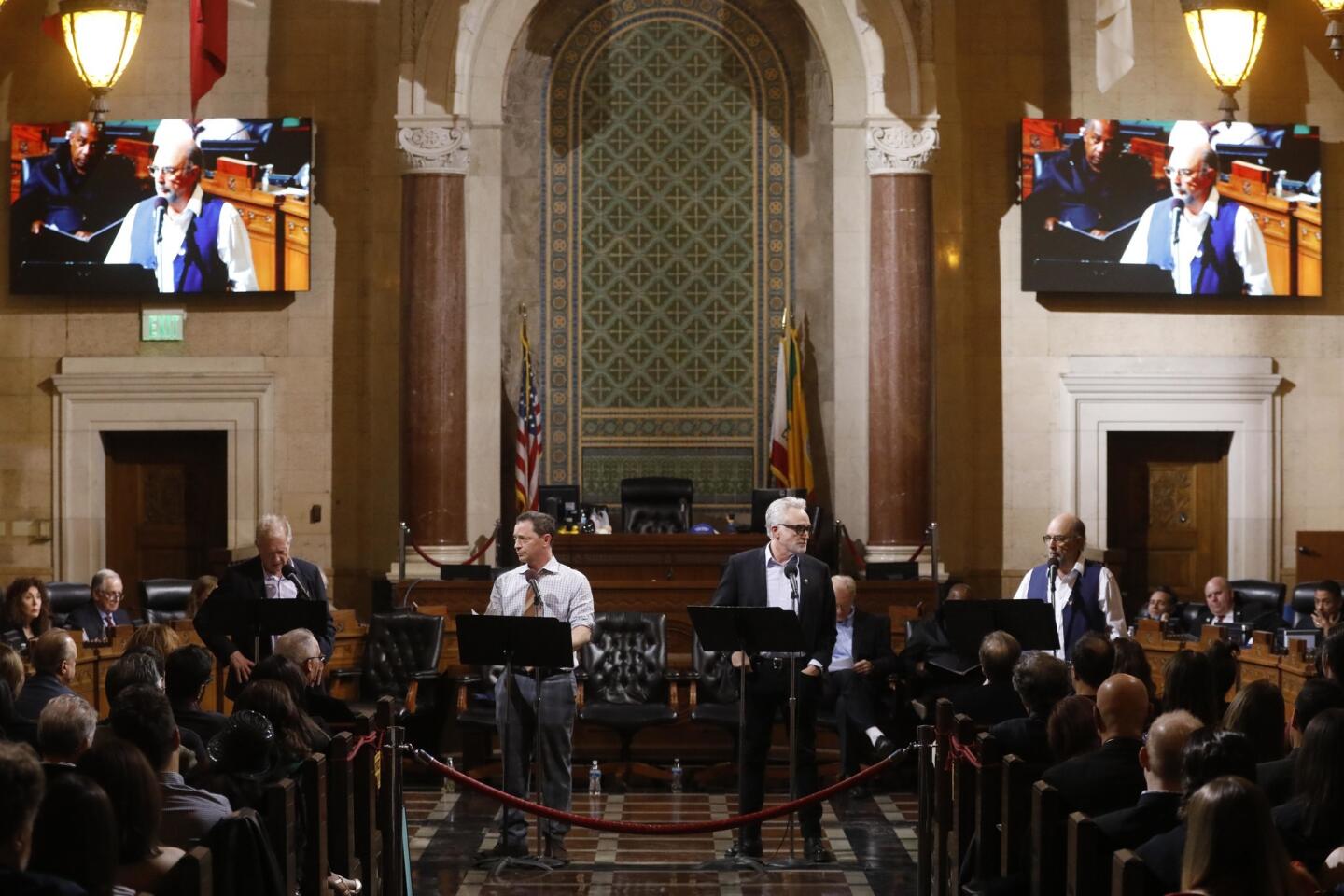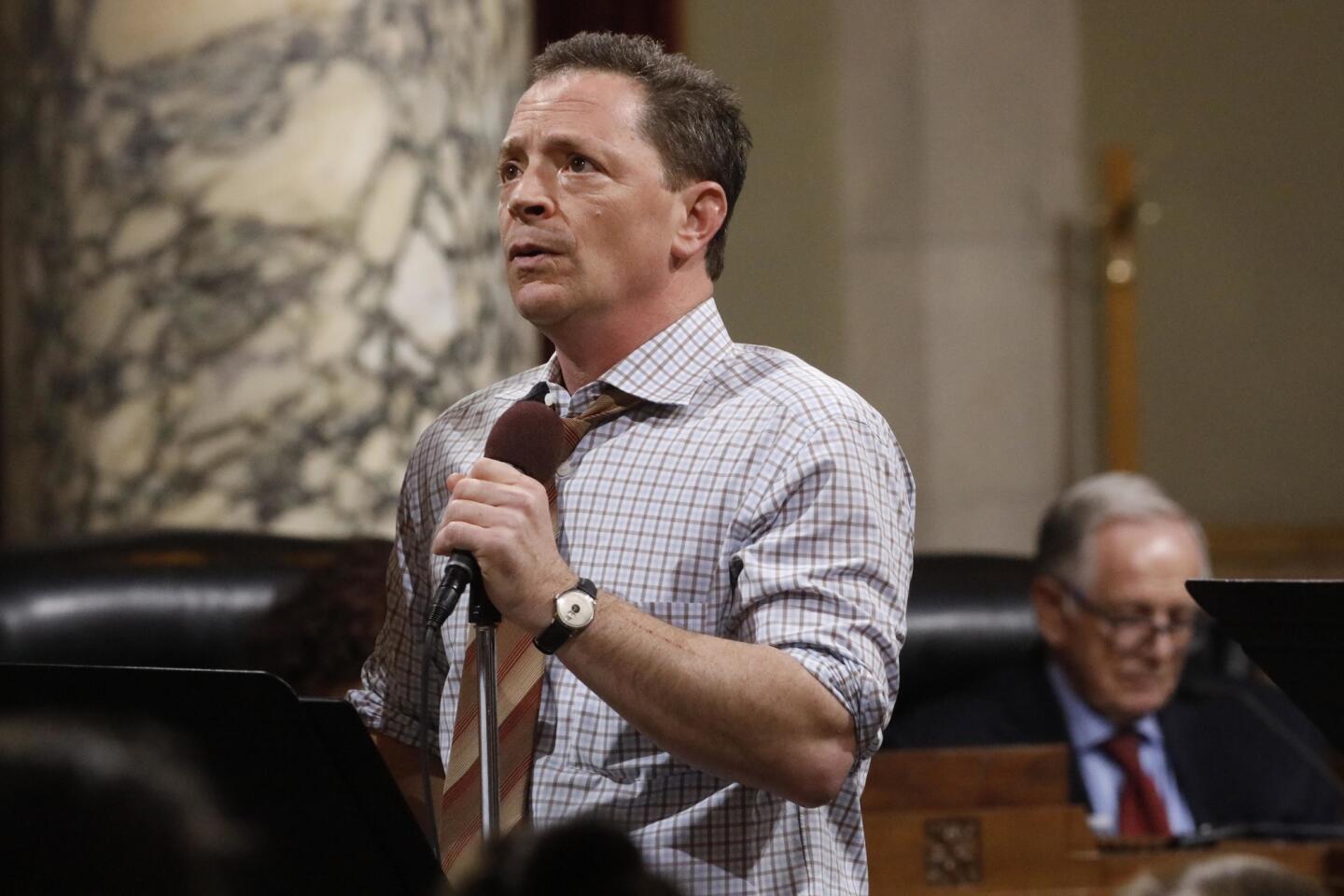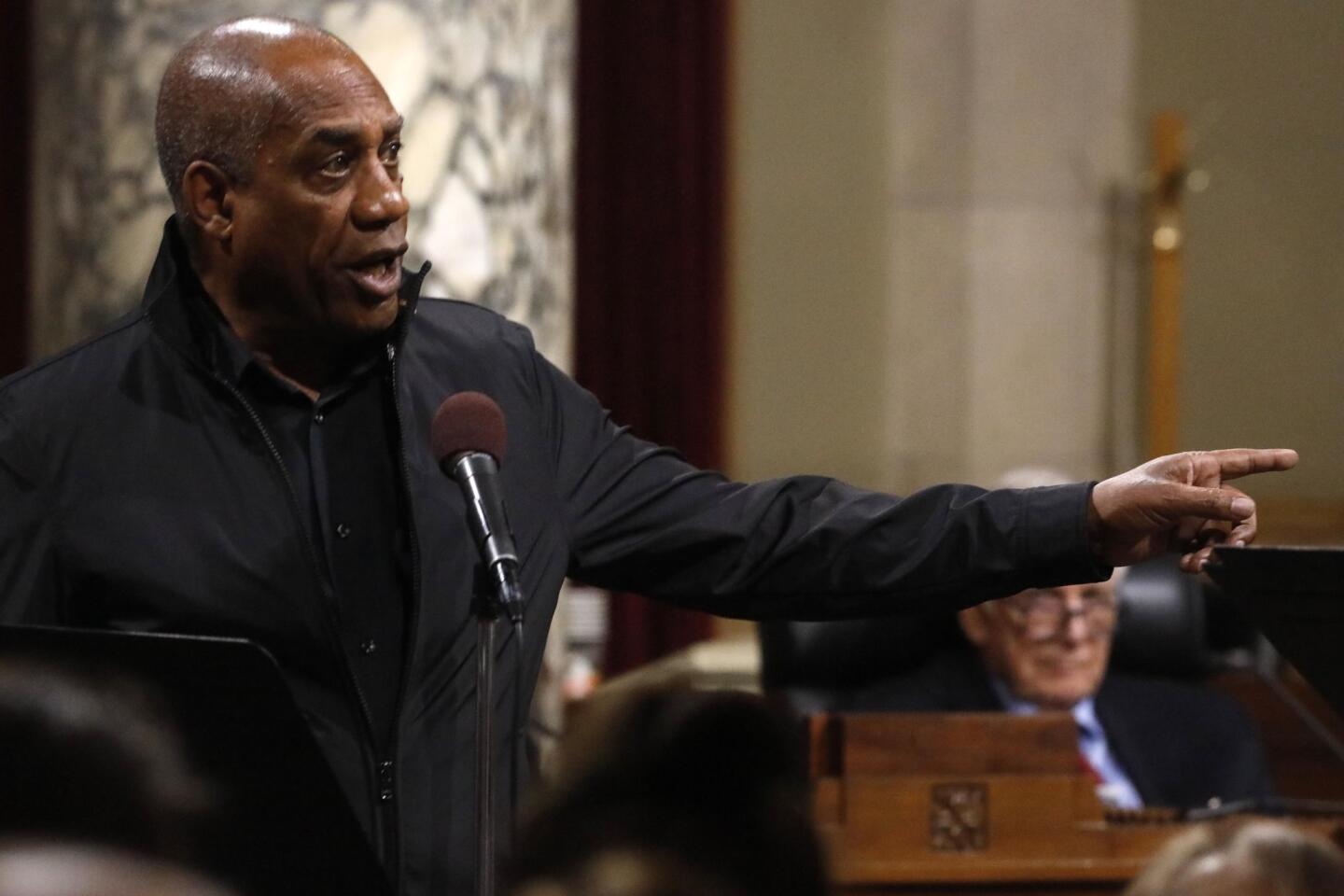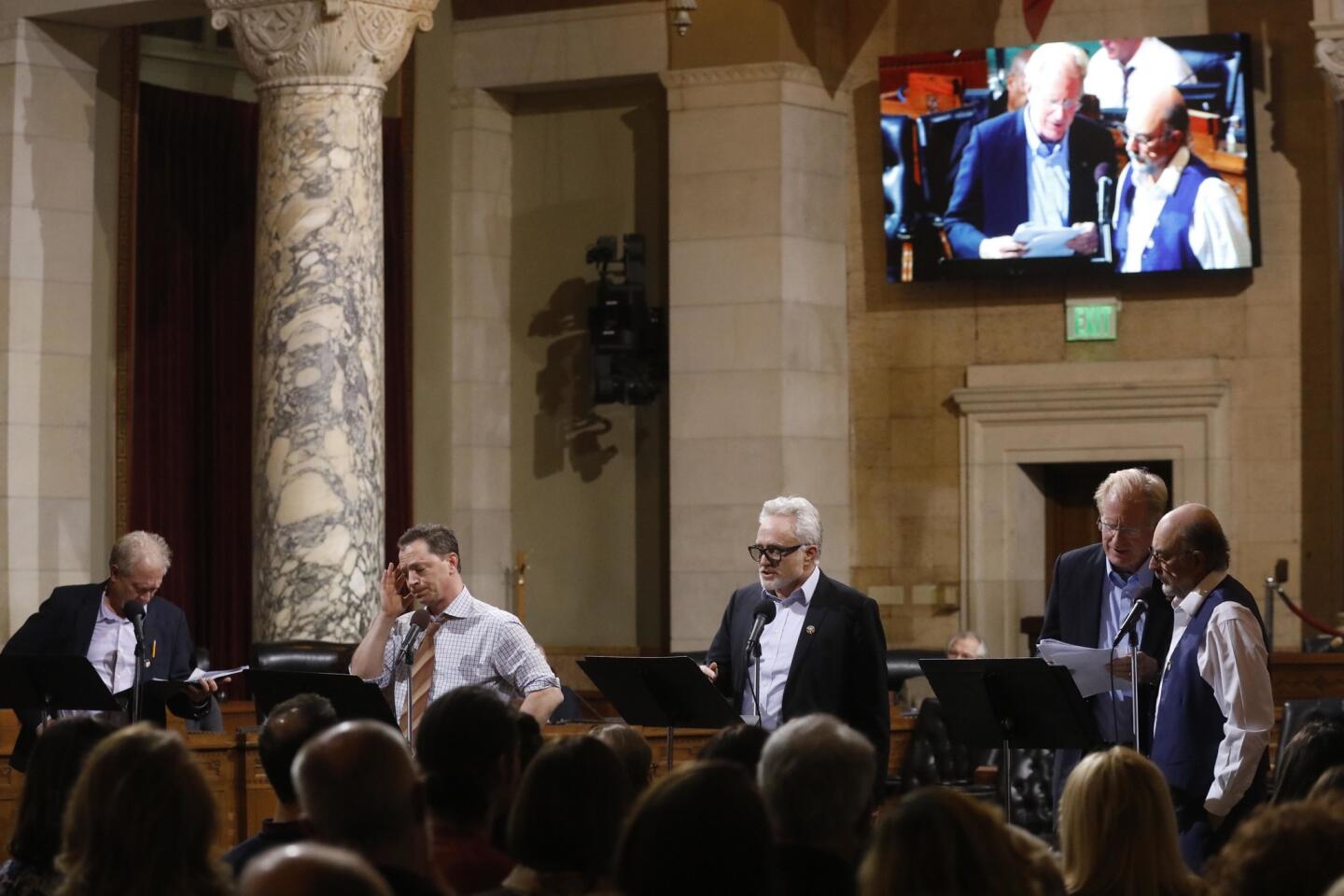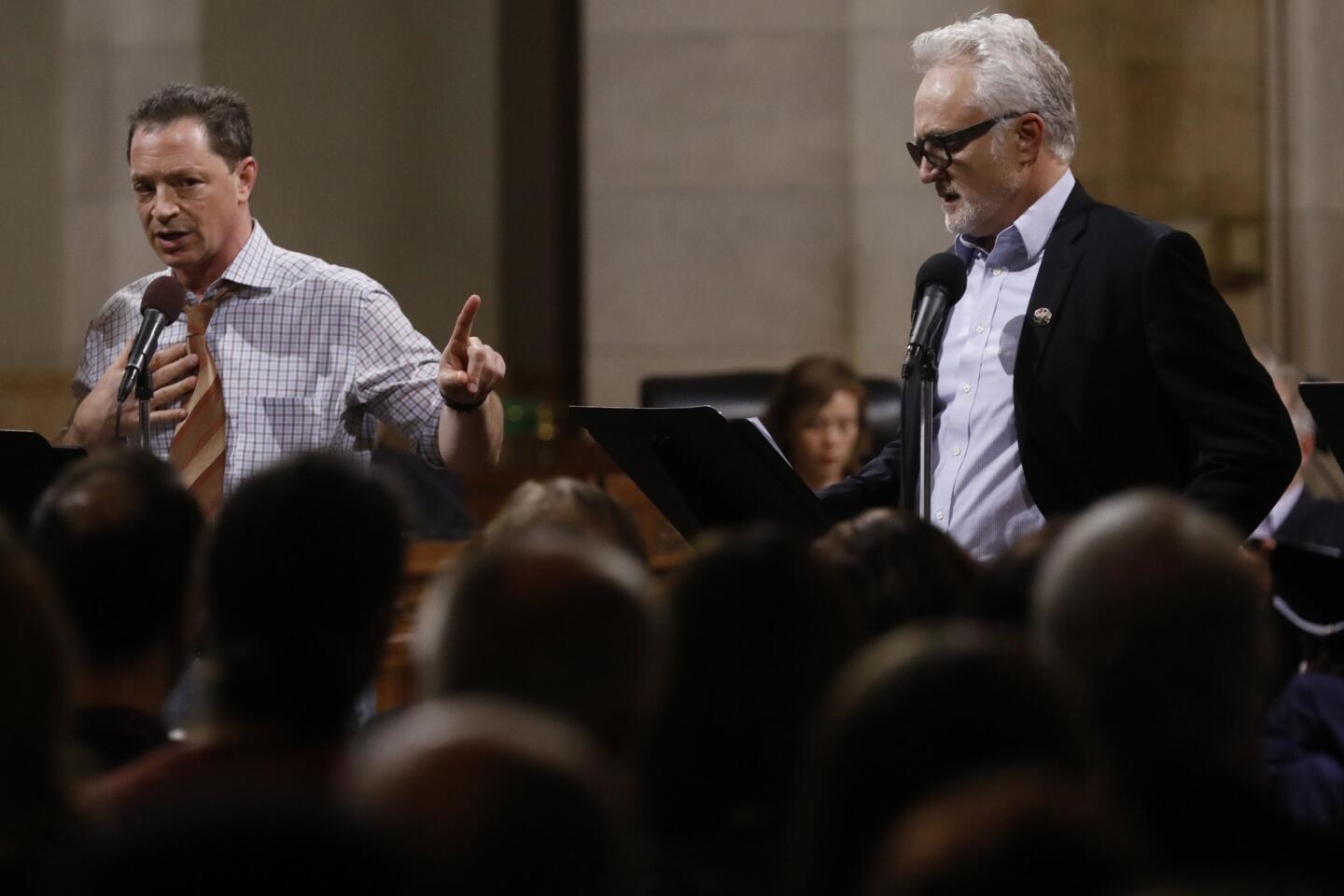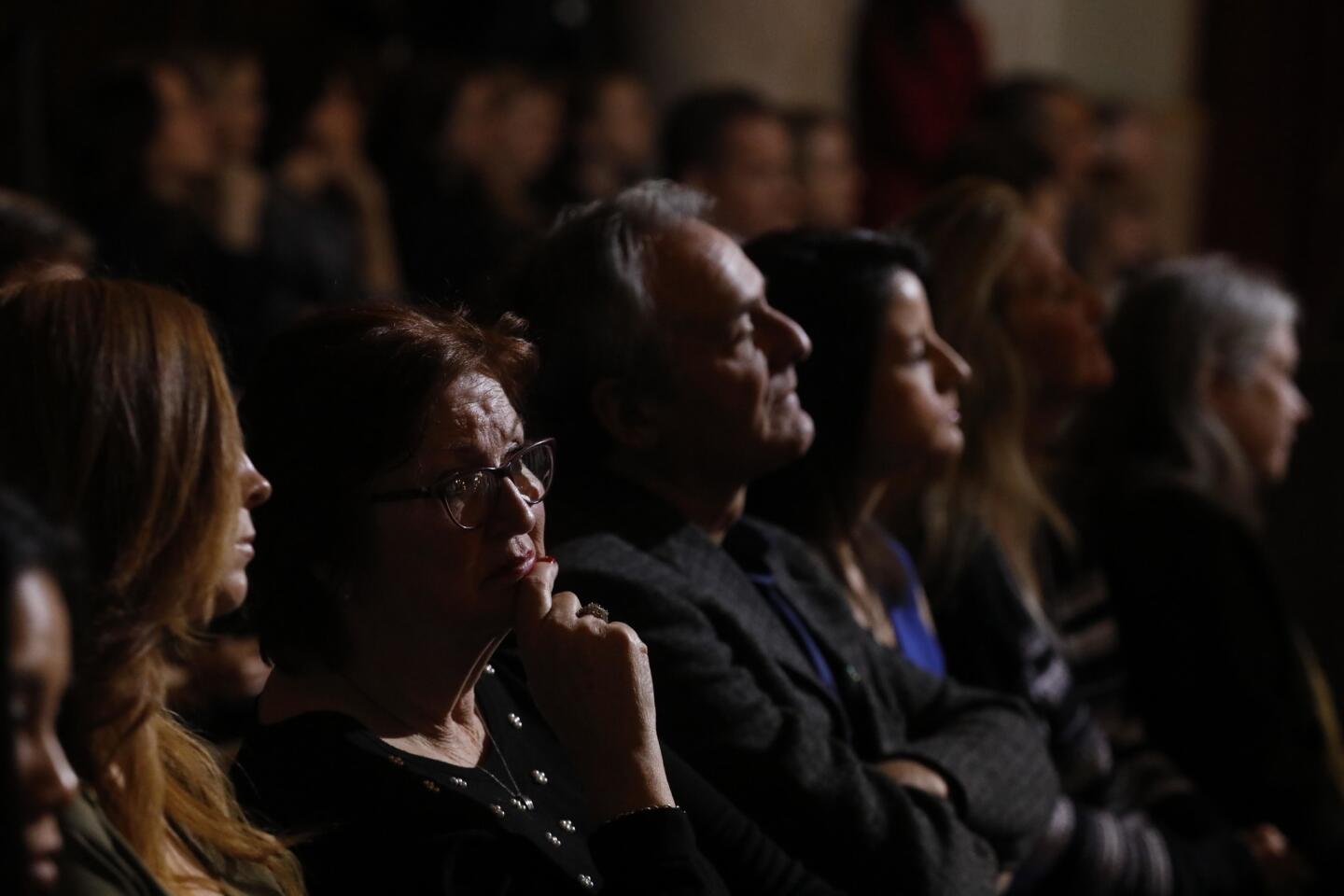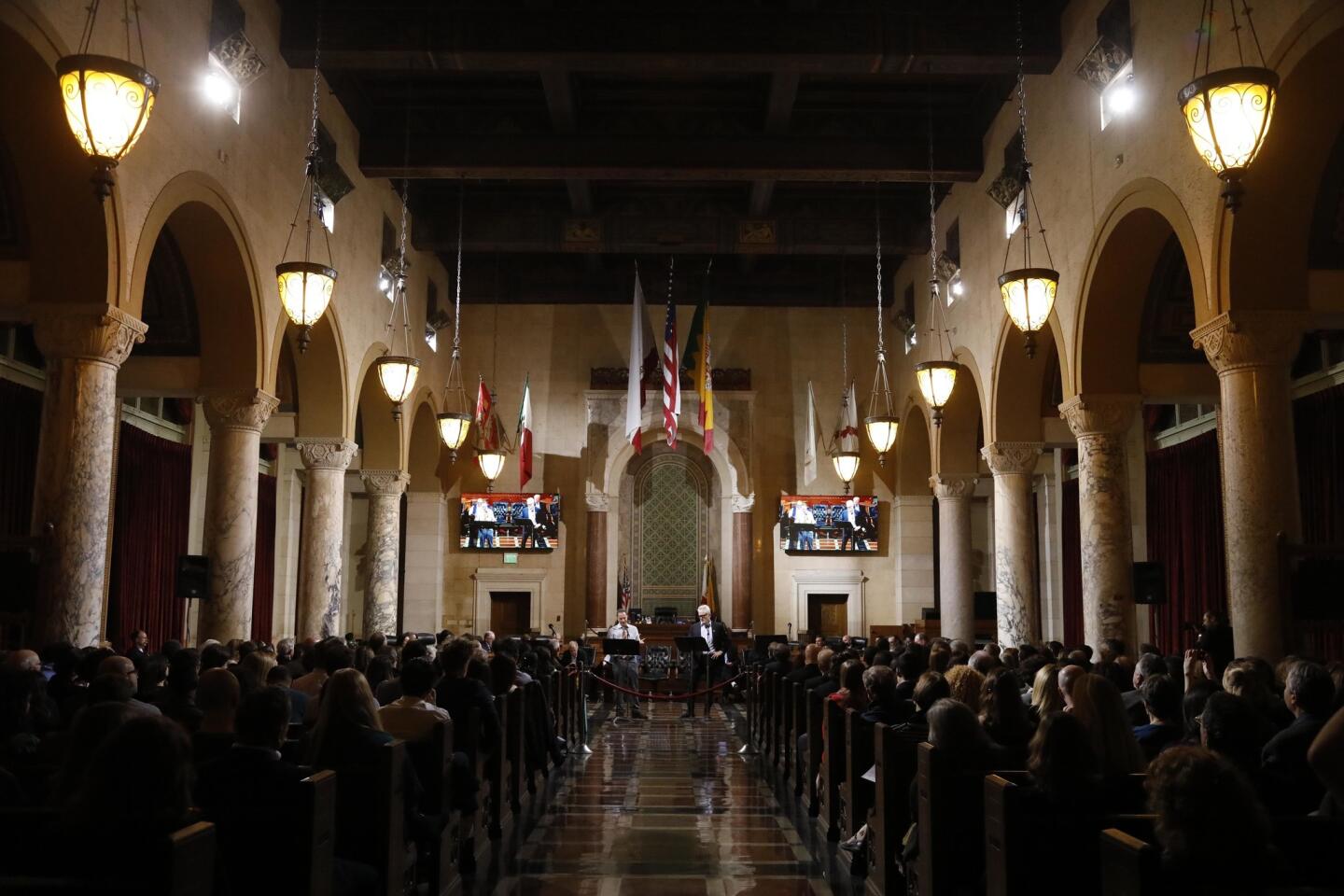With ‘West Wing’ help, ‘All the President’s Men’ gets a stirring, all-too-relevant revival
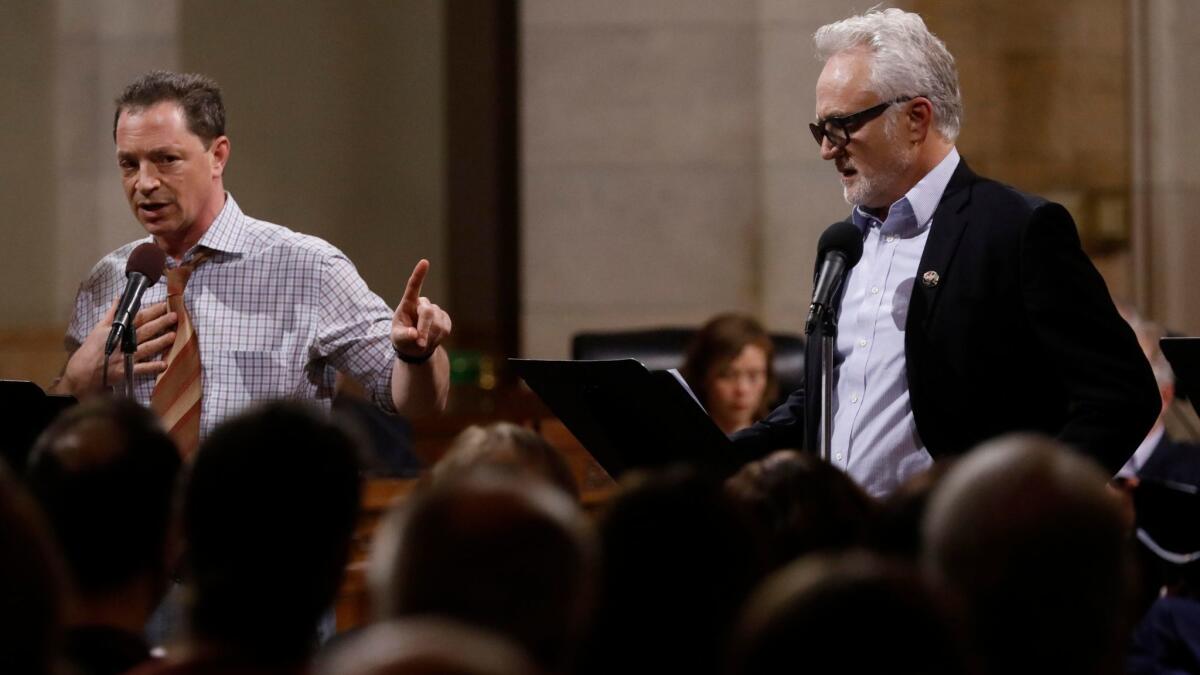
- Share via
At the electric reading of William Goldman’s screenplay for “All the President’s Men” at Los Angeles City Hall on Saturday night, Watergate once again had the freshness of current events.
Corruption and coverup are making headlines today just as they did in the early 1970s, when the historical drama (based on the book by Bob Woodward and Carl Bernstein) is set. Equally timely is the struggle of journalists to uncover the truth that politicians and their henchmen are determined to keep hidden from the voting public.
The Fountain Theatre, collaborating with the city of Los Angeles, presented this special event in the John Ferraro Council Chamber as a reminder of what’s at stake when the press is under siege, as it has been since President Trump starting slinging the phrase “fake news” at political coverage he’d like to make disappear.
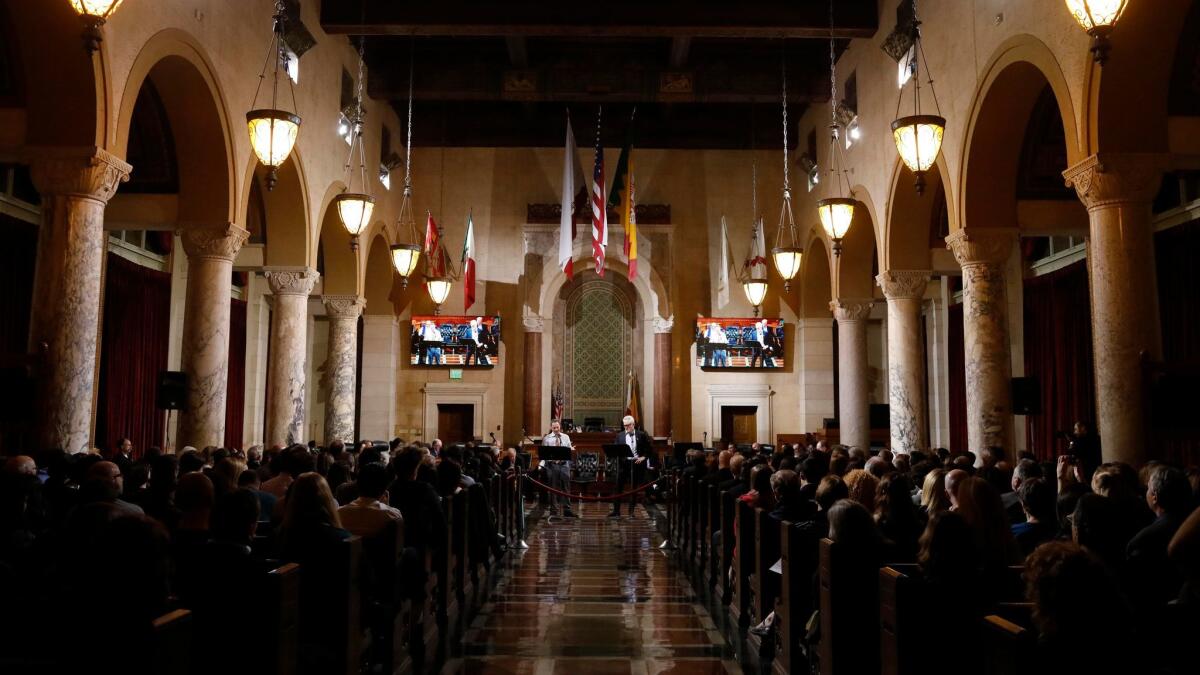
Actors from theater, film and television (many of them alumni from “The West Wing”) gathered at the seat of Los Angeles’ government in a show of solidarity with truth-seekers everywhere emboldened by the example of Woodward and Bernstein, whose Washington Post reporting of the Watergate scandal led to the resignation of President Nixon. The evening was an eloquent testimonial to the crucial watchdog role of the fourth estate.
The tribunal ambience of the council chambers seemed especially appropriate at a time when a pillar of democracy is itself on trial. An audience of celebrities (including Judd Hirsch) and ordinary citizens sat on wooden pews as cast members arrayed themselves behind desks, public hearing style, with small groups moving to standing microphones in the foreground as the suspenseful newsroom drama galloped from scene to scene.
In his prefatory remarks, Los Angeles Councilman Mitch O’Farrell, who hosted the free one-night event, reminded the audience of the primacy of 1st Amendment freedoms in the Bill of Rights and congratulated those in attendance on being part of the resistance. Stephen Sachs, the Fountain’s co-artistic director who directed the reading, expressed gratitude to Los Angeles for turning over City Hall to artists, who much like the journalists depicted in “All the President’s Men,” recognize free expression as a necessary condition for a well-functioning democracy.
Bradley Whitford gave cocky young Woodward a slightly sardonic edge. Joshua Malina brought out the persistence and precision of the more experienced Bernstein. Together, they painted an inspiring portrait of journalistic doggedness — the reporter as gumshoe detective rather than as showboating social media personality (something we have an oversupply of today).
One of the minor criticisms of Alan J. Pakula’s 1976 film was that the tools of the journalistic trade — pounding the pavement, cold calls on rotary phones, tense negotiations with impatient editors — aren’t inherently dramatic. But there’s something stirring in the depiction of old-school journalism at its unglamorous essence: the painstaking acquisition of concealed facts in the pursuit of a verifiable story intended to serve the public interest.
Rather than worrying about their positions in the Washington firmament, where access is prized over ethics, Woodward and Bernstein concentrate on cultivating new sources inside government. Whistle-blowers are coaxed to give more than they intend. Persuasion, rooted in appeals to justice and fair play, challenges partisanship.
Historical analogies are never exact, but one word struck a contemporary chord: “believe.” As the scope of Nixon’s crimes comes into focus, credulity is strained in the newsroom. Editors are having a hard time trusting a story that defies belief.
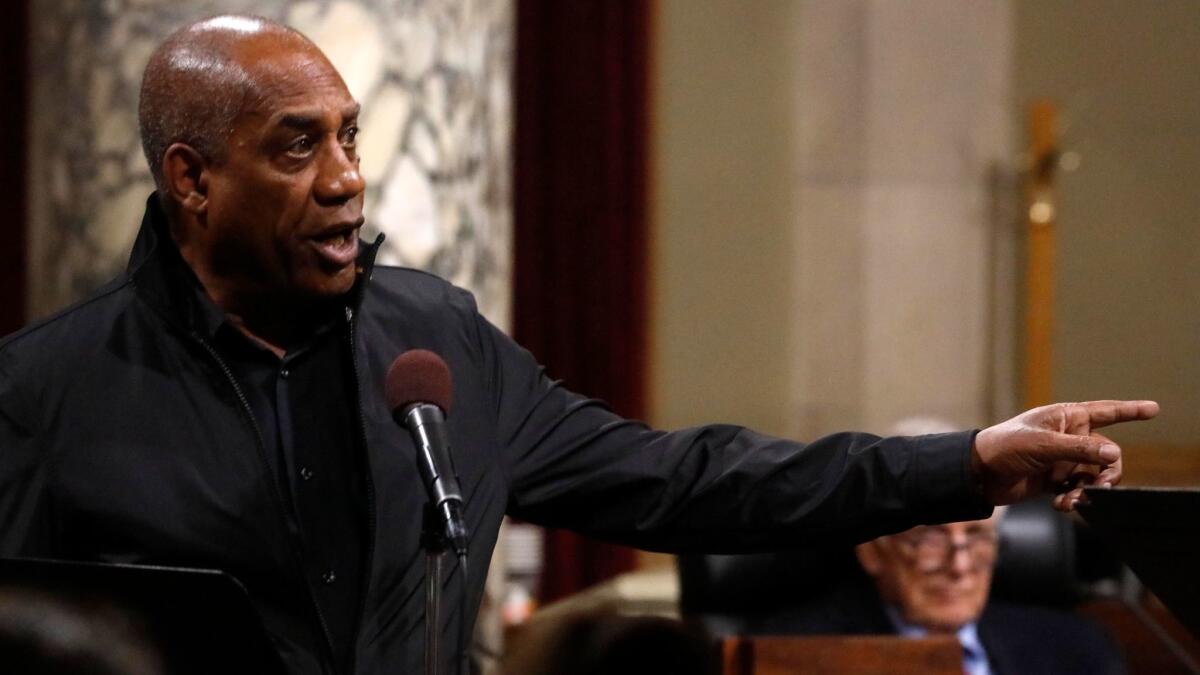
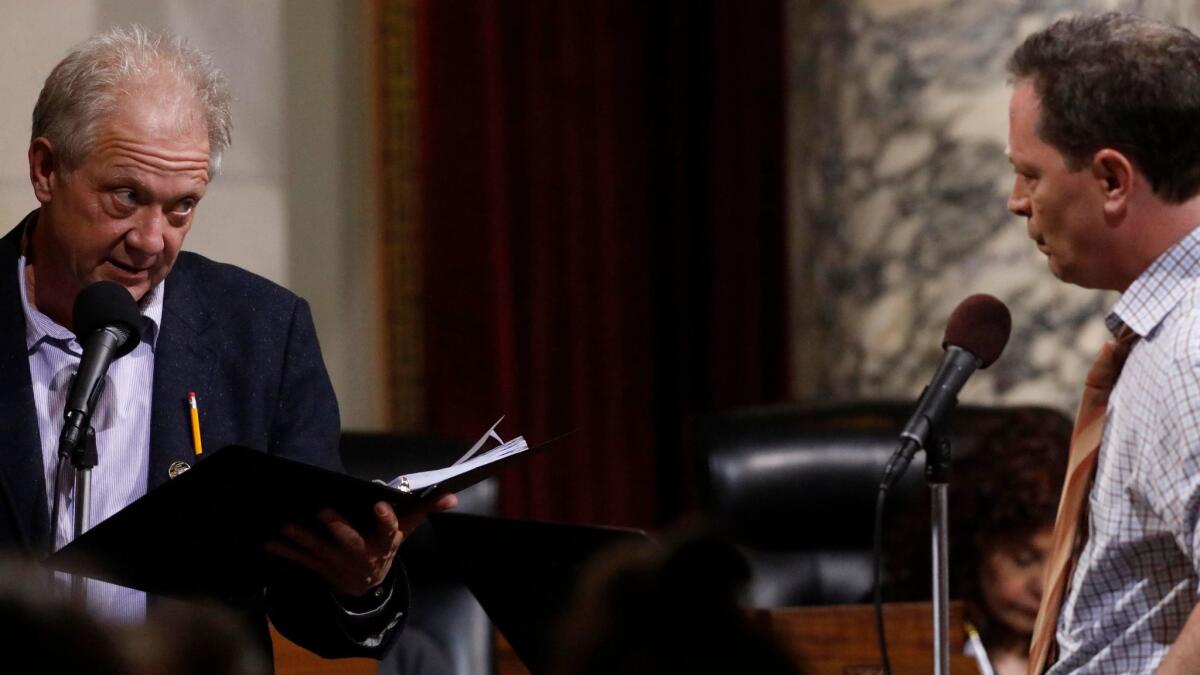
SIGN UP for the free Essential Arts & Culture newsletter »
Harry Rosenfeld (Richard Schiff) buys his reporters time when Howard Simons (Ed Begley Jr.) questions first their credentials and later their judgment. Ben Bradlee (Jeff Perry) erupts when he hears that Deep Throat (Joe Morton), Woodward’s secret source, is a shadowy figure cryptically confirming scoops in the bowels of a parking garage.
The news business, as Steven Spielberg’s film “The Post” powerfully depicts in its chronicling of another Washington Post muckraking milestone, can interfere with news-gathering. “All the President’s Men” dramatizes the fear running through the masthead over an investigation that the most powerful men in Washington want quashed.
There’s something stirring in the depiction of old-school journalism at its unglamorous essence: the acquisition of facts in the pursuit of a verifiable story.
How might American history have been changed without Bradlee’s courageous leadership? The question weighs heavily as the strained economics of journalism, exacerbated by technological shifts that have permanently transformed readership habits, have raised new challenges in the ability of newspapers to perform their duty of holding government officials to account.
Politicians are constitutionally resistant to transparency, but today, journalists seem to be fighting not just with the subjects of their coverage but with corporate overlords who are no longer sure that they want to keep funding such an expensive, idealistic mission. Partisan extremism has thrown up only more obstacles.
This reading of “All the President’s Men” provided a valuable reminder of what society stands to lose when journalism is assailed from all directions. (No wonder the Society of Professional Journalists, the ACLU of California and the Los Angeles Press Club were among the sponsors of Saturday’s event.)
Telling stories about the role that newspapers have played in defending our democracy is a civic imperative right now. These are dangerous times. Which is why it is heartening to see an intimate theater like the Fountain advocating for what is in our collective interest as a nation.
Follow me @charlesmcnulty
MORE:
How theater should respond to a democracy in meltdown
As artists fall into disgrace, must their art be consigned to oblivion?
‘Pirates of Penzance’: Gilbert & Sullivan as interactive party
More to Read
The biggest entertainment stories
Get our big stories about Hollywood, film, television, music, arts, culture and more right in your inbox as soon as they publish.
You may occasionally receive promotional content from the Los Angeles Times.
